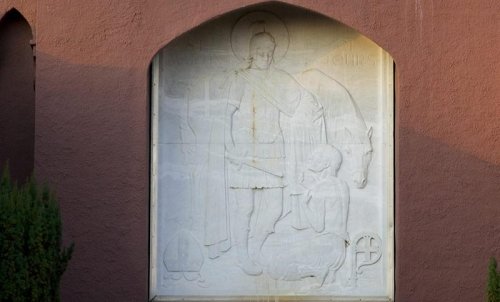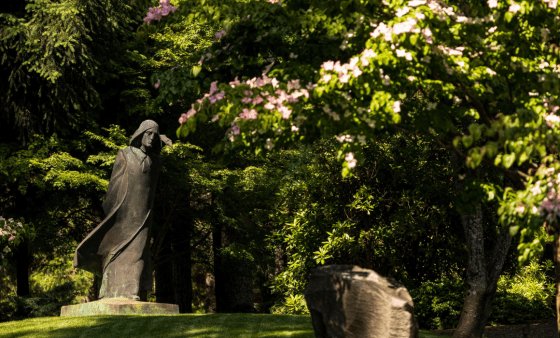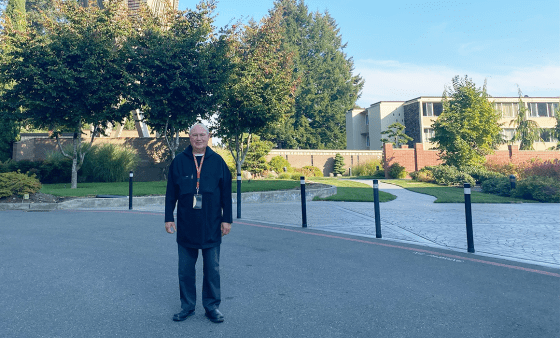Our patron saint: Saint Martin of Tours

"Lord, if your people still have need of my services, I will not avoid the toil. Your will be done."
- Saint Martin of Tours
Saint Martin of Tours, patron saint of Saint Martin's University, figures prominently in the development of Christianity in fourth-century Europe. This gentle, humble servant of God, known best for helping those most in need, was chosen by the people of Tours as their spiritual leader, a role he reluctantly accepted. As bishop of Tours, he went on to establish about 3,500 churches.
Born about 316 A.D., in the region that is now Western Hungary, Martin was the son of pagan parents. While he was still a child, his father was transferred to Pavia in Northern Italy, and it was here that he first was drawn to Christianity.
He horrified his father, a tribune in the army, by studying to become a Christian. But as a soldier’s child, he was required to serve in the Army. He was held in chains until he agreed to take his military oath, which he then honored. Although his youth was spent as a cavalryman in the Roman army, he continued to yearn for something more.
Legend has it that Martin, while he was a young soldier stationed in the land of Gaul – now France – chanced upon a shivering, miserable beggar clutching his rags about him in the bitter cold one day. He noticed no one was helping the man, but Martin had nothing with him but the soldier’s clothes he wore. Overcome with concern, Martin removed his heavy wool cavalry cloak and cut it in two, then gave half to the beggar.
Later, Martin had a vision in which Jesus was wearing the half-cloak he’d given the beggar. In his dream, Jesus told the Angels around him that it had been given to him by Martin. Martin immediately became baptized, and not long after, he refused to fight the invading Francs on grounds of conscience, landing in prison. When the invaders suddenly decided to enter peace negotiations, Martin was released and obtained a discharge from the army.
As a free man, he began his commitment to Christianity in earnest, studying under famous scholars and teachers of the era. For many years, he preached and evangelized throughout the countryside, living as a missionary and helping the poor and the sick. His reputation for holiness attracted other monks, and they formed what would become the Benedictine abbey of Liguge, the oldest known abbey in Europe.
Soon, he was considered the holiest man in France.
At a time when bishops were still chosen by the people, he was sought out to serve as bishop after the previous bishop died. Everyone knew Martin was too humble to accept the position, so they resorted to trickery, asking him to come to the church to care for a sick woman. A well-known story surrounds the incident. When Martin realized their real purpose, he hid from the people of Tours in a shed full of geese. The squawking geese quickly revealed his hiding place, and he reluctantly agreed to serve as bishop.
When Martin was consecrated, in 371, he chose to continue living a life of humility and compassion, rather than adopting the rich lifestyle of most bishops. He continued caring for the sick and those in great need, and he developed a reputation for saving the lives of prisoners. He made rounds of the parishes in his area, established many new ones and started several monastic communities.
In artistic works, Saint Martin is often symbolized as a cavalryman on a horse, cutting his cloak for a beggar or with a flock of geese, recalling the story surrounding his election as bishop of Tours.
Saint Martin's Abbey and University are proud to bear the name of this illustrious and selfless patron, whose feast day is celebrated here and in many areas of Europe on Nov. 11.
Theology and Religious Studies
The Theology and Religious Studies Department is rooted at the heart of Saint Martin’s identity as a Catholic and Benedictine University and thus proudly and hospitably serves our diverse community of students. Our courses invite students to engage in questions posed since ancient times by various religions, and of Catholic Christianity in particular, such as the ultimate meaning of human existence in relation to God and the establishment of an ethical society. We encourage students to appreciate the influence of religion throughout human history and in current global affairs as foundational for further, deeper reflection on religious belief as transformative of the human person in their theological, spiritual, artistic, social, ethical, narrative, and scriptural dimensions.
- Campus
-
- Main (Lacey)
- Type of Instruction
-
- In Person
- Degree
-
- Bachelor of Arts


